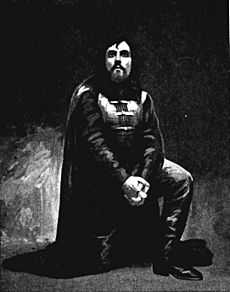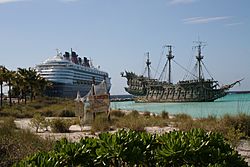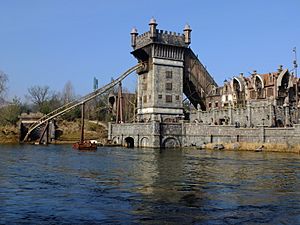Flying Dutchman facts for kids
Quick facts for kids Flying Dutchman |
|
|---|---|
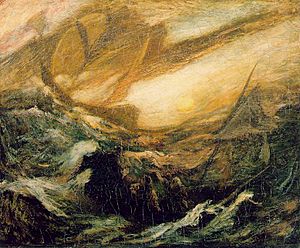
The Flying Dutchman by Albert Pinkham Ryder c. 1887 (Smithsonian American Art Museum)
|
|
| Captain | Willem van der Decken |
The Flying Dutchman (Dutch: De Vliegende Hollander) is a famous legend about a ghost ship. People say this ship can never stop sailing and is stuck at sea forever. This spooky story probably started a long time ago during the 1600s. This was a time when the Netherlands was a powerful country with many ships, especially from the Dutch East India Company. The oldest known story about the Flying Dutchman is from the late 1700s.
According to the legend, if another ship tries to talk to it, the crew of the Flying Dutchman might try to send messages. These messages are often for people on land, even people who have been dead for a long time! When people claimed to see it in the 1800s and 1900s, they often said the ship glowed with a ghostly light. Sailors believed seeing this ghost ship was a sign of bad luck or danger. Many thought the Flying Dutchman looked like a type of Dutch cargo ship called a fluyt.
Contents
Where the Legend Began
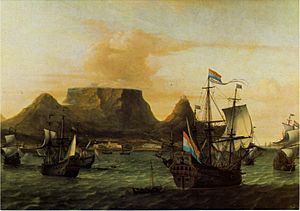
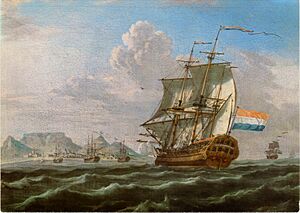
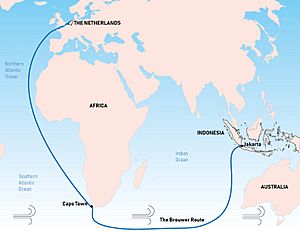
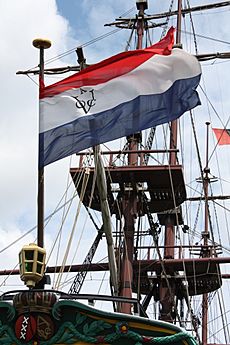
The first time the Flying Dutchman was mentioned in print was in a book from 1790 by John MacDonald. He wrote:
The weather was so stormy that the sailors said they saw the Flying Dutchman. The common story is that this Dutchman came to the Cape in distress of weather and wanted to get into harbour but could not get a pilot to conduct her and was lost and that ever since in very bad weather her vision appears.
Another early mention was in a book from 1795 by George Barrington. He wrote about sailors' beliefs and a Dutch warship lost near the Cape of Good Hope. The story says that some years later, another ship saw what looked like the lost ship. Sailors believed it was the ghost of the ship, and that's how the name Flying Dutchman spread.
In 1803, John Leyden added a new idea to the legend. He wrote that the ship's crew might have done something terrible. Because of this crime, they were cursed to sail the ocean forever.
The famous writer Sir Walter Scott was one of the first to say the Flying Dutchman was a pirate ship. He wrote in 1812 that the ship had a lot of treasure. He also said that a terrible crime, like murder or piracy, happened on board. Seeing the ghost ship was thought to be a very bad sign for sailors.
Some people believe the captain of the ghost ship is based on a real Dutch captain named Bernard Fokke. He was known for making very fast trips from the Netherlands to Java. People even suspected he had made a deal with the Devil to travel so quickly.
The first full story of the legend was printed in 1821. It named the captain as Hendrick Van der Decken. This story added details like the captain trying to send letters to people who had died long ago. It also said that if you accepted these letters, it would bring bad luck. The captain had sworn he would sail around the Cape of Good Hope, even if it took until the end of the world.
She was an Amsterdam vessel and sailed from port seventy years ago. Her master's name was Van der Decken. He was a staunch seaman, and would have his own way in spite of the devil... The story is this: that in doubling the Cape they were a long day trying to weather the Table Bay... Van der Decken walked the deck, swearing at the wind... Van der Decken replied: "May I be eternally damned if I do, though I should beat about here till the day of judgment." And to be sure, he never did go into that bay, for it is believed that he continues to beat about in these seas still, and will do so long enough. This vessel is never seen but with foul weather along with her.
Famous Sightings
Many people have claimed to see the Flying Dutchman in the 1800s and 1900s. One very famous sighting was by Prince George of Wales, who later became King George V.
In 1881, when he was a teenager, Prince George was on a three-year sea journey. His logbook, a kind of diary, describes what happened on July 11, 1881, off the coast of Australia:
July 11th. At 4 a.m. the Flying Dutchman crossed our bows. A strange red light as of a phantom ship all aglow, in the midst of which light the masts, spars and sails of a brig 200 yards distant stood out in strong relief as she came up on the port bow... Thirteen persons altogether saw her... At 10.45 a.m. the ordinary seaman who had this morning reported the Flying Dutchman fell from the foretopmast crosstrees on to the topgallant forecastle and was smashed to atoms.
This entry describes a strange red light like a ghost ship. It appeared very close, but then disappeared completely. What made this sighting even more eerie was that a sailor who reported seeing the ship later fell from a mast and died.
Scientific Explanations
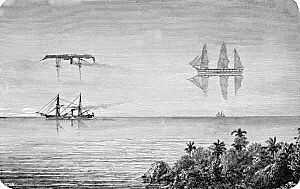
Scientists and experts have tried to explain the sightings of the Flying Dutchman. The most likely explanation is a type of mirage called a Fata Morgana.
A mirage happens when light rays bend as they pass through layers of air with different temperatures. This can make distant objects appear higher or lower than they really are. It can also make them look stretched or upside down.
Imagine a ship far away, beyond the horizon. If the air conditions are just right, a mirage could make it look like the ship is floating in the sky. This could explain why sailors thought they saw a "flying" ghost ship. Another similar effect is called looming. This makes objects that are just out of sight appear visible, or makes them look much taller than they are.
The Flying Dutchman in Stories and Art
The legend of the Flying Dutchman has inspired many books, plays, movies, and even music.
In Books
- The famous poem The Rime of the Ancient Mariner (1797–98) by Samuel Taylor Coleridge has a ghost ship that might have been inspired by the Flying Dutchman story.
- British author Brian Jacques wrote a series of fantasy books for young adults. They are about a boy and his dog who are part of the Dutchman's crew. An angel tells them to help people in need. The first book is called Castaways of the Flying Dutchman (2001).
In Opera and Theatre
- Richard Wagner wrote a famous opera called The Flying Dutchman in 1843. In his story, the captain of the Dutchman is cursed to sail forever. But he can be saved if a woman truly loves him. He is allowed to step on land every seven years to find such a woman.
In Television
- The kids' show SpongeBob SquarePants features a character called the Flying Dutchman. He is a green ghost sailor who sometimes causes trouble for SpongeBob.
- In the anime and manga series One Piece, the Flying Dutchman appears as a ghost ship captained by Van der Decken.
In Film
- The Pirates of the Caribbean movies feature a famous ship named the Flying Dutchman. It is captained by Davy Jones. Later, Will Turner becomes its captain. In these movies, the captain is cursed to sail the seas forever, only able to step on land once every ten years.
In Music
- Many songs have been written about the Flying Dutchman. For example, the Dutch band Carach Angren made a whole album about the legend.
- David Bowie's band Tin Machine mentions it in their song "Amlapura."
- "Flying Dutchman" is a song by Tori Amos from her 1992 album Little Earthquakes.
In Leisure and Aviation
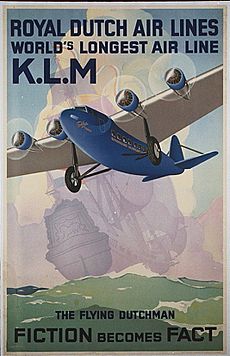
- The Efteling amusement park in the Netherlands has a roller coaster called De Vliegende Hollander (The Flying Dutchman). It tells the story of Captain Willem van der Decken.
- KLM Royal Dutch Airlines uses the slogan "The Flying Dutchman" on its planes. This refers to the idea of endless travel.
In Sports
- There is a type of fast, two-person racing dinghy (a small sailboat) called the Flying Dutchman. It was even an Olympic sport.
- Many famous athletes from the Netherlands have been nicknamed "The Flying Dutchman." These include football players Dennis Bergkamp (who was called "the Non-Flying Dutchman" because he was afraid of flying) and Robin van Persie. The American baseball player Johannes Peter "Honus" Wagner was also called the Flying Dutchman because he was fast and had German heritage.
See also
 In Spanish: El holandés errante (leyenda) para niños
In Spanish: El holandés errante (leyenda) para niños
- 90377 Sedna – a dwarf planet nicknamed the Flying Dutchman
- Caleuche
- Davy Jones's locker
- Wandering Jew
- List of ghosts
 | May Edward Chinn |
 | Rebecca Cole |
 | Alexa Canady |
 | Dorothy Lavinia Brown |


